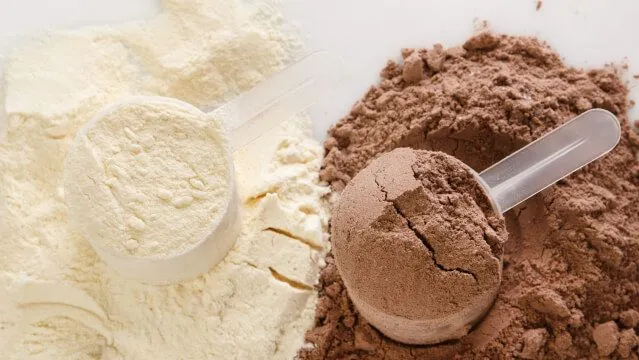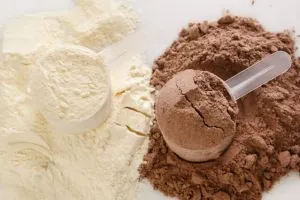
- Share on Facebook65
- Share on Pinterest
- Share on Twitter
What exactly is whey protein? It’s the isolated form of protein found in whey, the liquid that remains after milk has been curdled and strained.
First, let’s talk about the different types of whey protein available.
Whey protein isolate: This is whey protein in its most pure form. It’s about 90 percent protein by weight, and it’s often the most expensive option.
Whey protein concentrate: This ranges from about 29 percent to around 89 percent protein by weight. It’s not as expensive as whey protein isolate, and it contains a little more fat and lactose.
Hydrolyzed whey protein: This form of whey protein is said to be “predigested,” and therefore easier to absorb. It is more expensive than the concentrate.
So what are the benefits and drawbacks of whey protein? Let’s discuss a few.
Benefits
Absorption: Liquids are easier for the body to absorb than solid foods. Therefore, since whey protein powders are most frequently dissolved in beverages, the body absorbs the protein more quickly. This is especially beneficial for those who choose to consume protein after a workout, in order to rebuild muscle.
Convenience: Let’s face it, it’s not always easy to bring a chicken breast or salmon fillet to the office. But adding whey protein to a smoothie can make it much easier to get enough protein each day — particularly for those who may be avoiding or limiting the amount of meat they eat.
It may be acceptable for those who have trouble with dairy
This will vary from person to person. Although it comes from milk, whey protein is an isolated form of protein from whey, and therefore it does not have much lactose, especially if you choose the first form listed above. That said, it does contain small amounts, and if you’re particularly sensitive to lactose, it might not be the best option for you.
Downfalls
Undesirable ingredients: Whey protein powder is a processed product and often contains ingredients like soybean oil, artificial sweeteners, artificial flavors, and xanthan gum. If you prefer to keep these ingredients out of your diet, you might want to find an alternative protein source.
 Effects on the kidneys and liver: Taking in too much whey protein powder can cause the body to store it as fat (the amount that’s considered “too much” depends in part on your body weight). In turn, this can overwork the kidney and liver functions. Anyone who has pre-existing kidney conditions should consult their doctor before adding whey protein to their diet.
Effects on the kidneys and liver: Taking in too much whey protein powder can cause the body to store it as fat (the amount that’s considered “too much” depends in part on your body weight). In turn, this can overwork the kidney and liver functions. Anyone who has pre-existing kidney conditions should consult their doctor before adding whey protein to their diet.
It’s a less nutrient-dense calorie source: Whey protein powder adds calories to your diet, but the only nutritional benefit you’re getting for those added calories is protein. On the other hand, if you choose options like yogurt, salmon, or chicken, for example, you’ll be getting protein as well as a range of other nutrients. In addition, whole foods will fill you up much more than protein powder.
Just like anything, we caution you to do all of your research before purchasing/using a whey protein to be sure it is the right choice for your health.
—The Alternative Daily
- Share on Facebook65
- Share on Pinterest
- Share on Twitter

